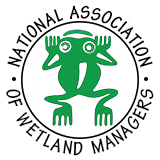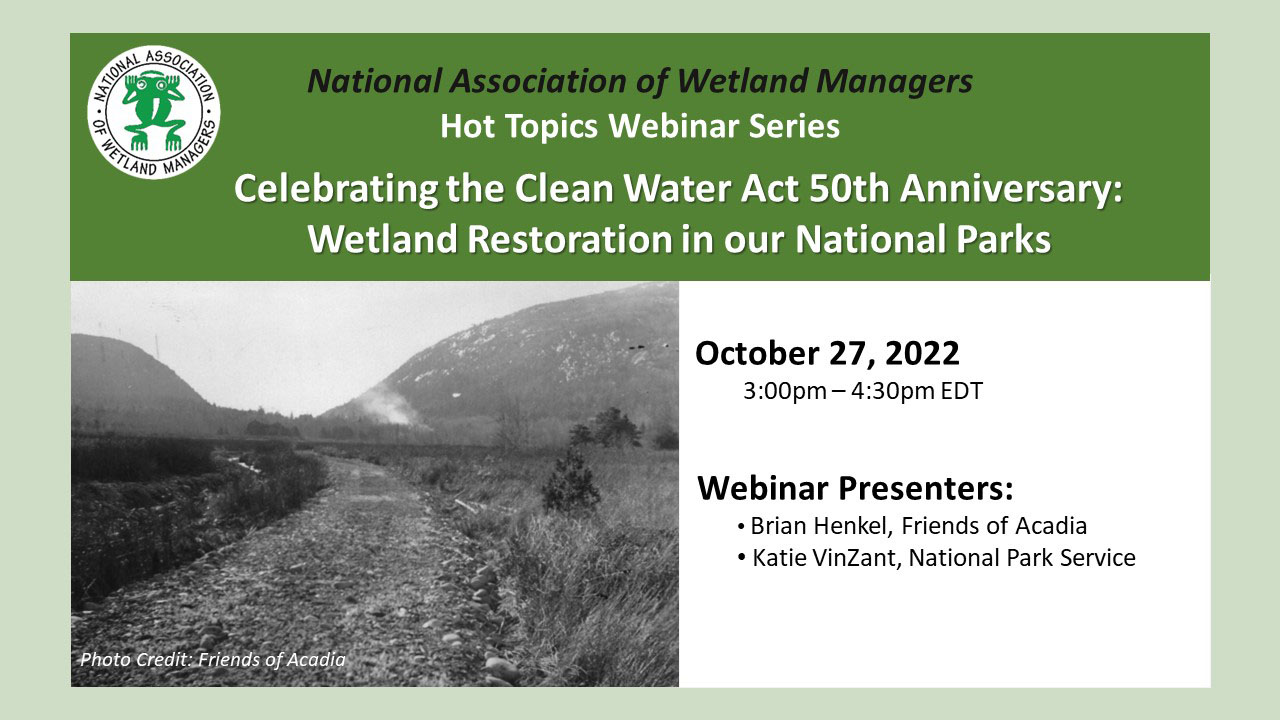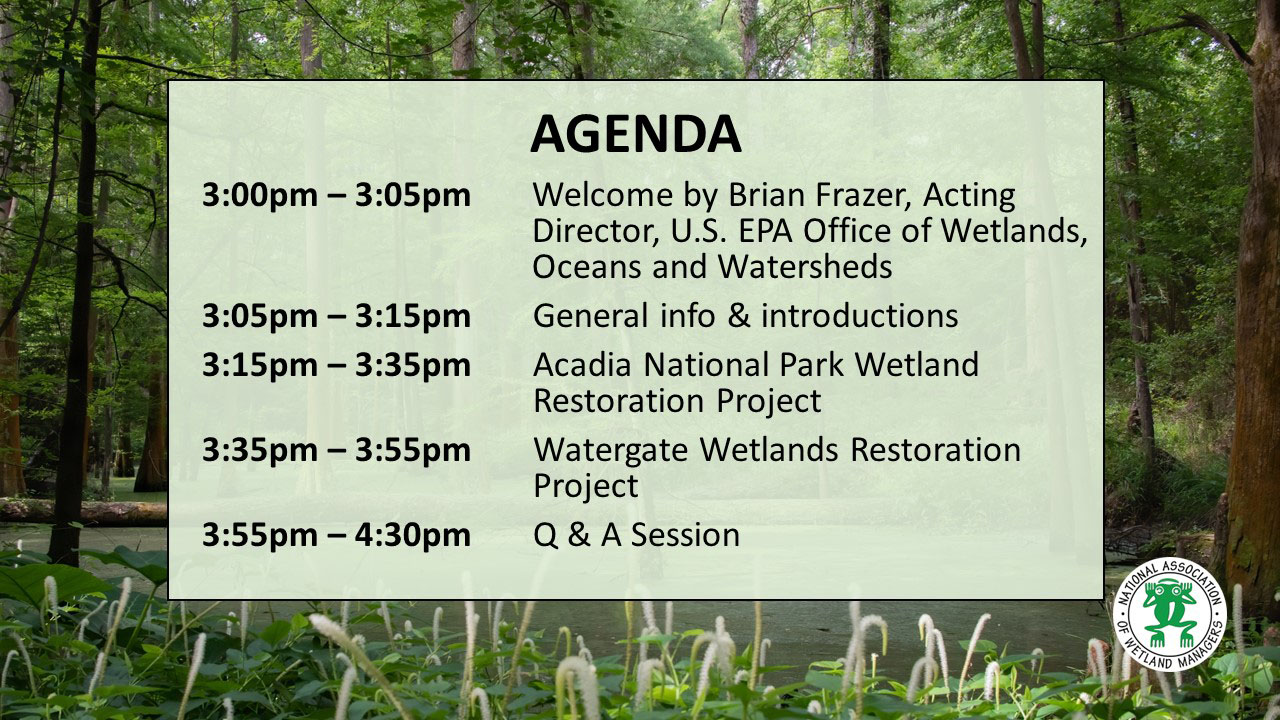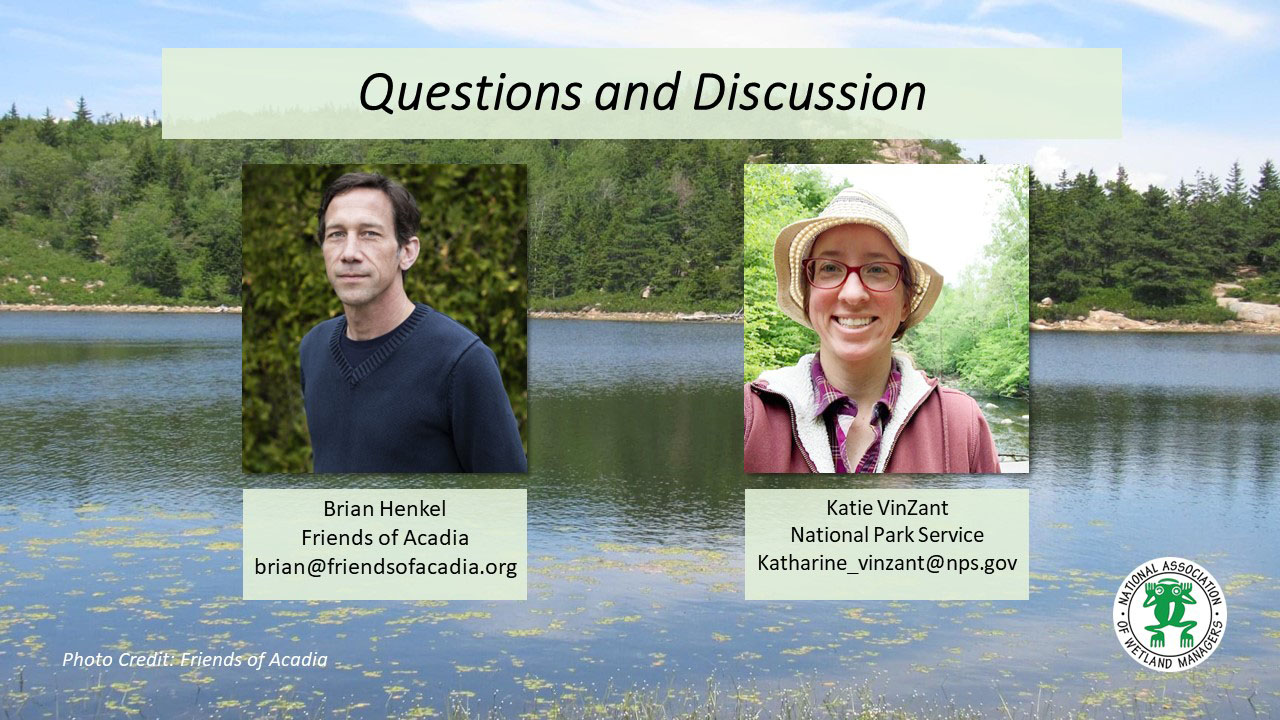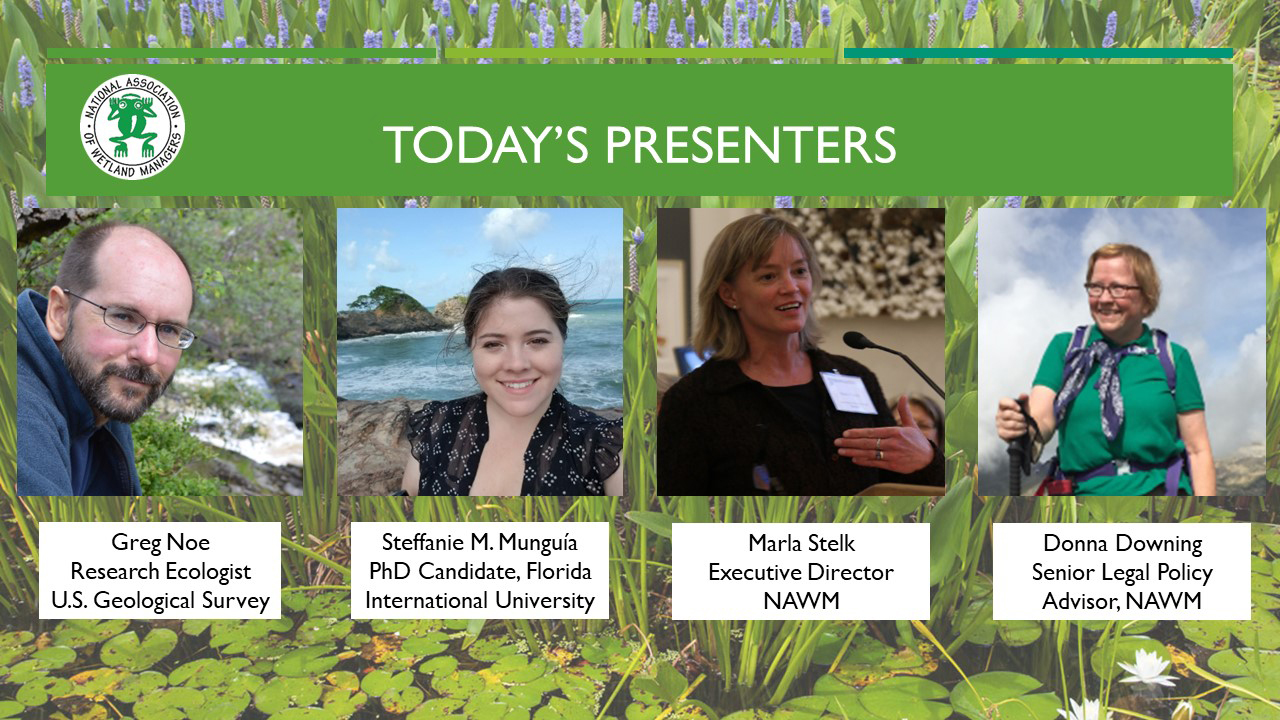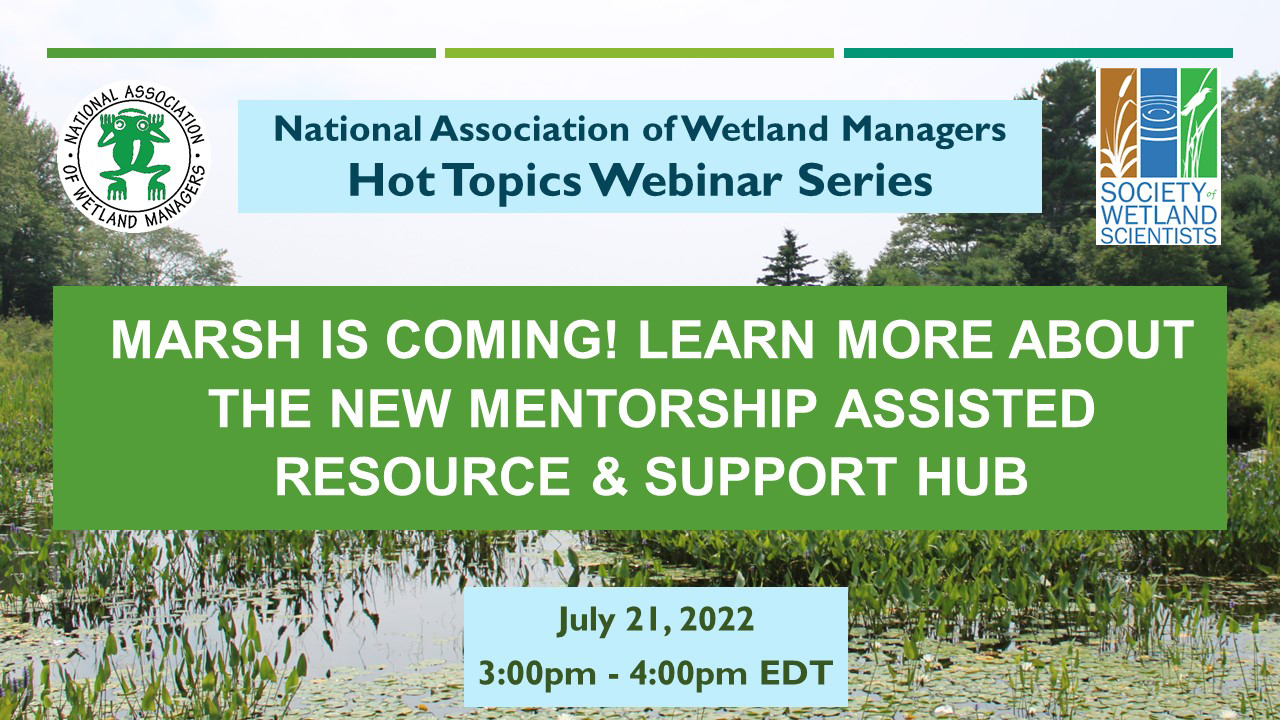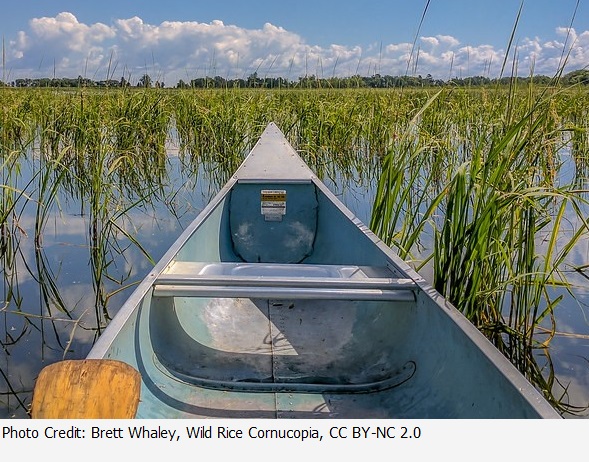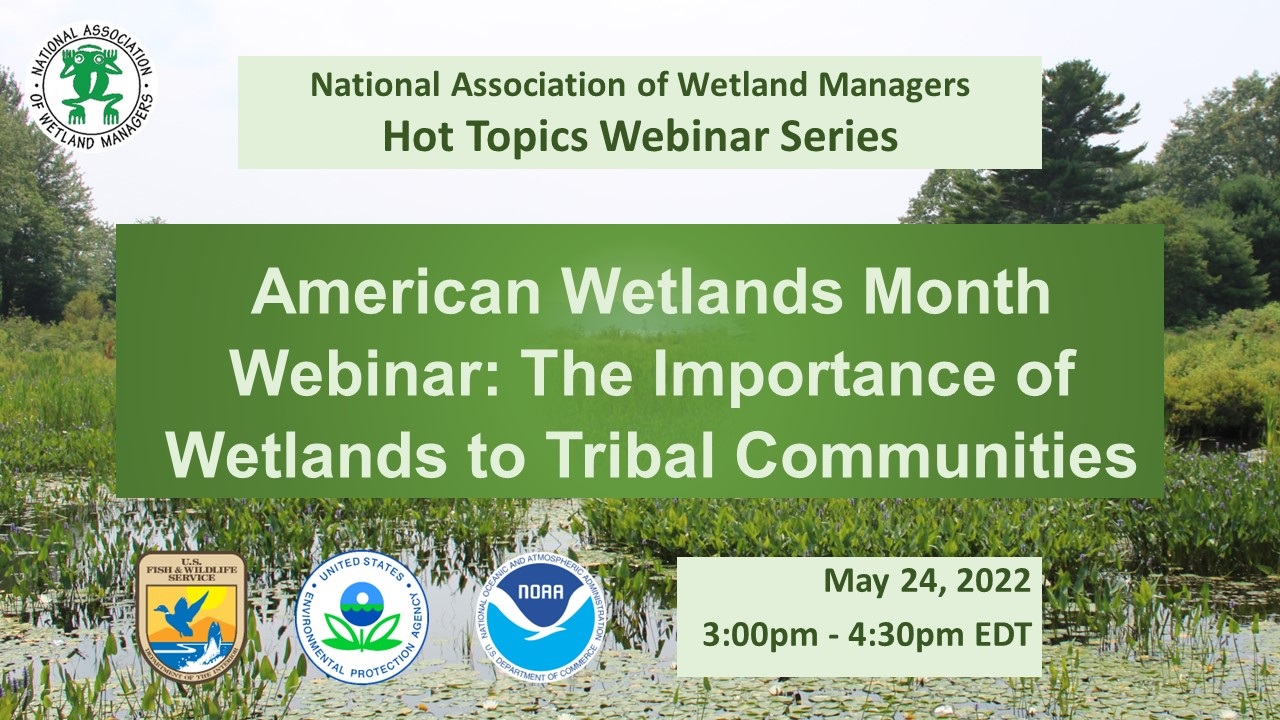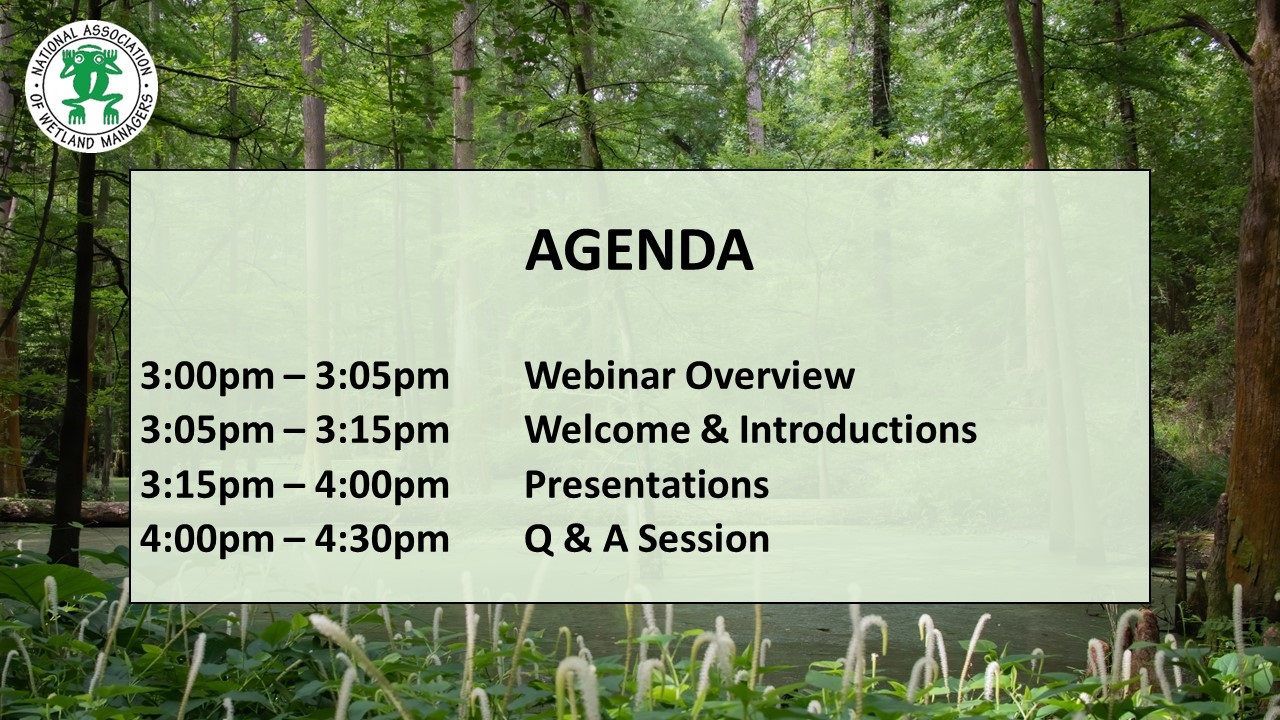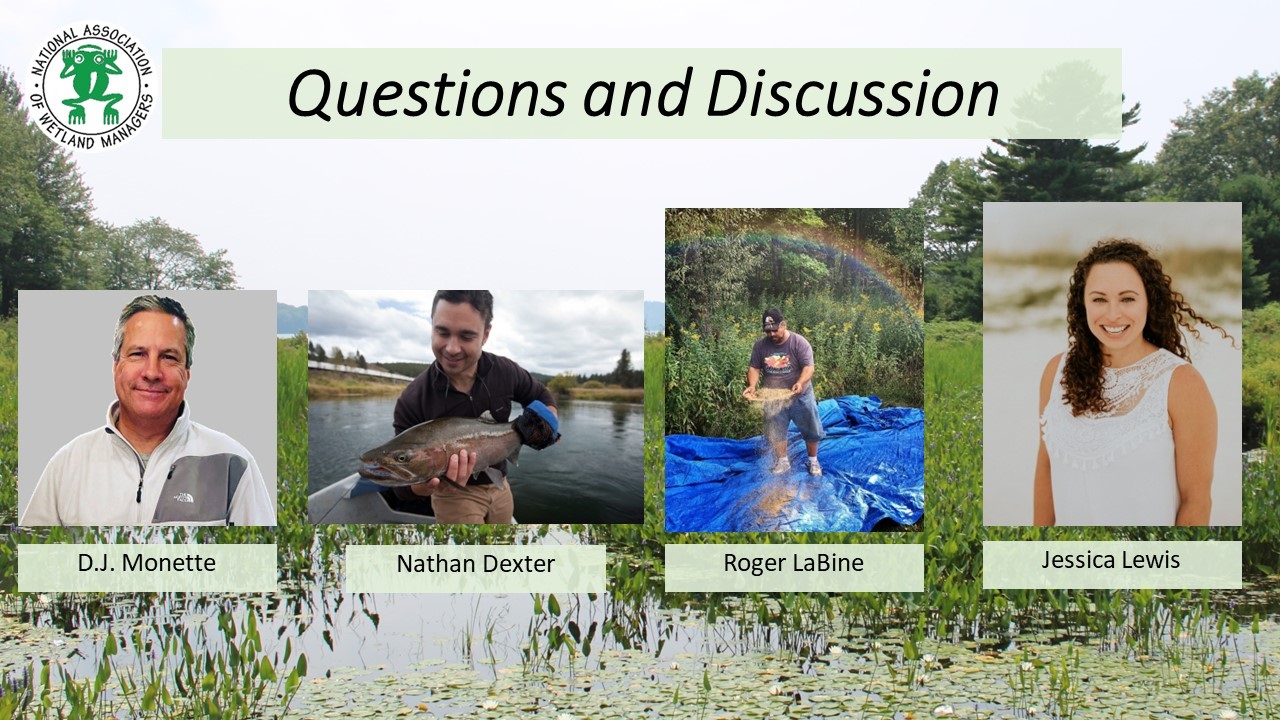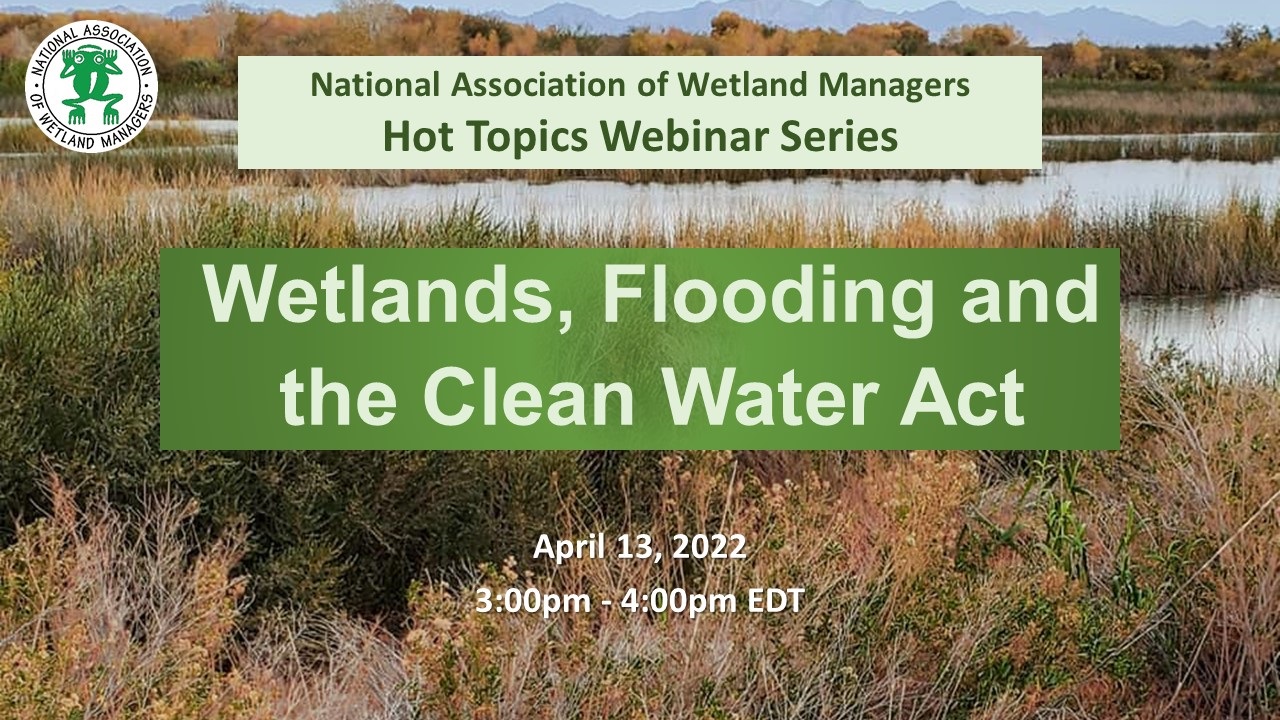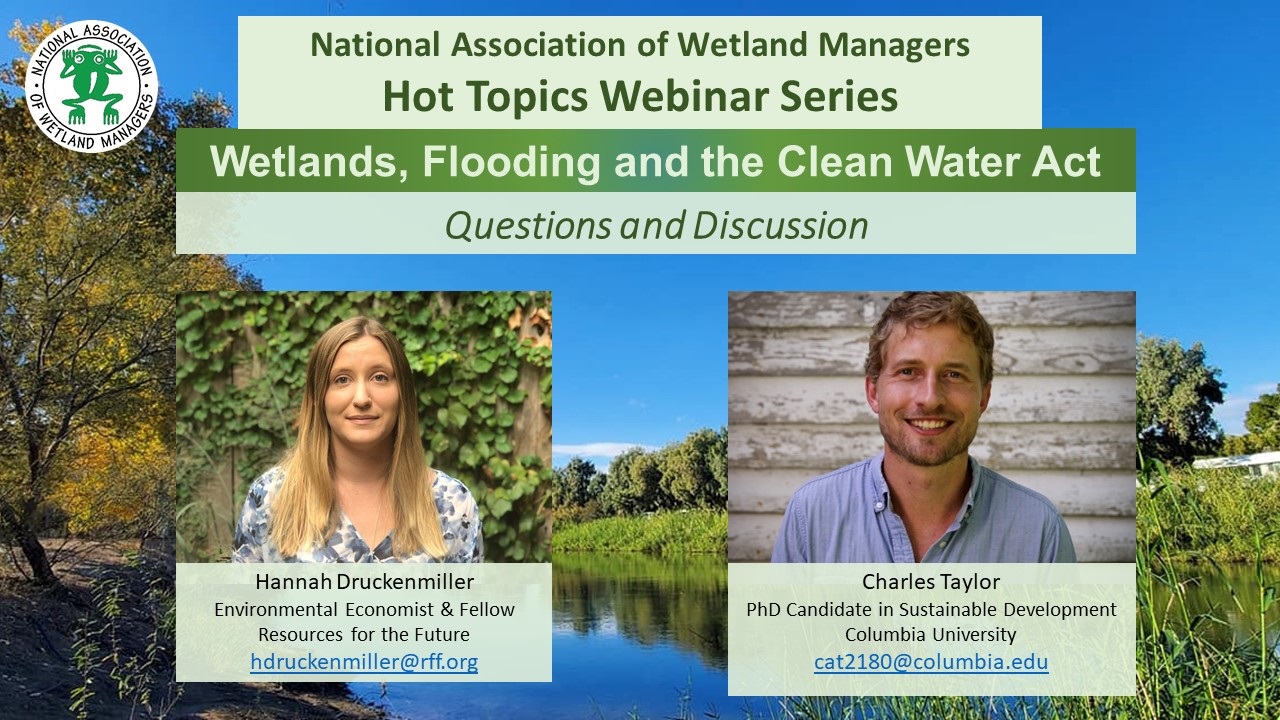Celebrating the Clean Water Act 50th Anniversary: Wetland Restoration in our National Parks
Held Thursday, October 27, 2022 - 3:00 p.m.-4:30 p.m. EDT
This webinar concluded a month-long celebration of the Clean Water Act’s (CWA) 50th Anniversary with our Hot Topics webinar highlighting wetland restoration projects in our national parks. We began with a warm welcome from Brian Frazer, Acting Director of the Office of Wetlands, Oceans, and Watersheds, U.S. Environmental Protection Agency. The CWA was championed by the late Senator Edmund S. Muskie from Maine, and since NAWM is headquartered in Portland, Maine, our first presentation was about a wetland restoration project in Acadia National Park using funds from the Bipartisan Infrastructure Law. Then we heard about a massive 85-acre wetland restoration that was completed for the Delaware Water Gap National Recreation Area.
ABSTRACTS
Brian Henkel
Acadia gets about six inches more precipitation each year than it did 100 years ago, and more of that precipitation falls in extreme weather events. One of every six plant species found in the park in the late 1800s no longer occurs there. Many animals have been lost too—moving to the north—while others have arrived from the south. At the same time, visitation to the park has skyrocketed from 2.4 million visits in 2011 to more than 4 million visits in 2021. These rapid changes challenge national park managers. Historically, park managers focused on maintaining the park to past conditions — to restore things to the way they were. Now managers must learn how to manage for change—working to keep park ecosystems healthy as they change quickly. This webinar shared a new approach to wetland restoration in a changing climate and lessons learned.
Kate VinZant
Delaware Water Gap National Recreation Area, which is managed by the National Park Service, recently undertook the 85-acre Watergate Wetlands Restoration Project. In the early to mid- 1800s the project area watershed experienced large scale land manipulation, including the installation of ditches and dikes to drain wetlands and diversion of watercourses to create farmable land. The primary goals of this project were to restore wetlands that were historically present and the natural hydrologic function of Van Campens Brook. Restoration activities included topsoil salvage, site recontouring, soil decompaction, creation of wildlife habitat structures, installation of native seed and container plants, and invasive plant control.
INTRODUCTION
- Marla Stelk, Executive Director, National Association of Wetland Managers [PRESENTATION PDF]
WELCOME
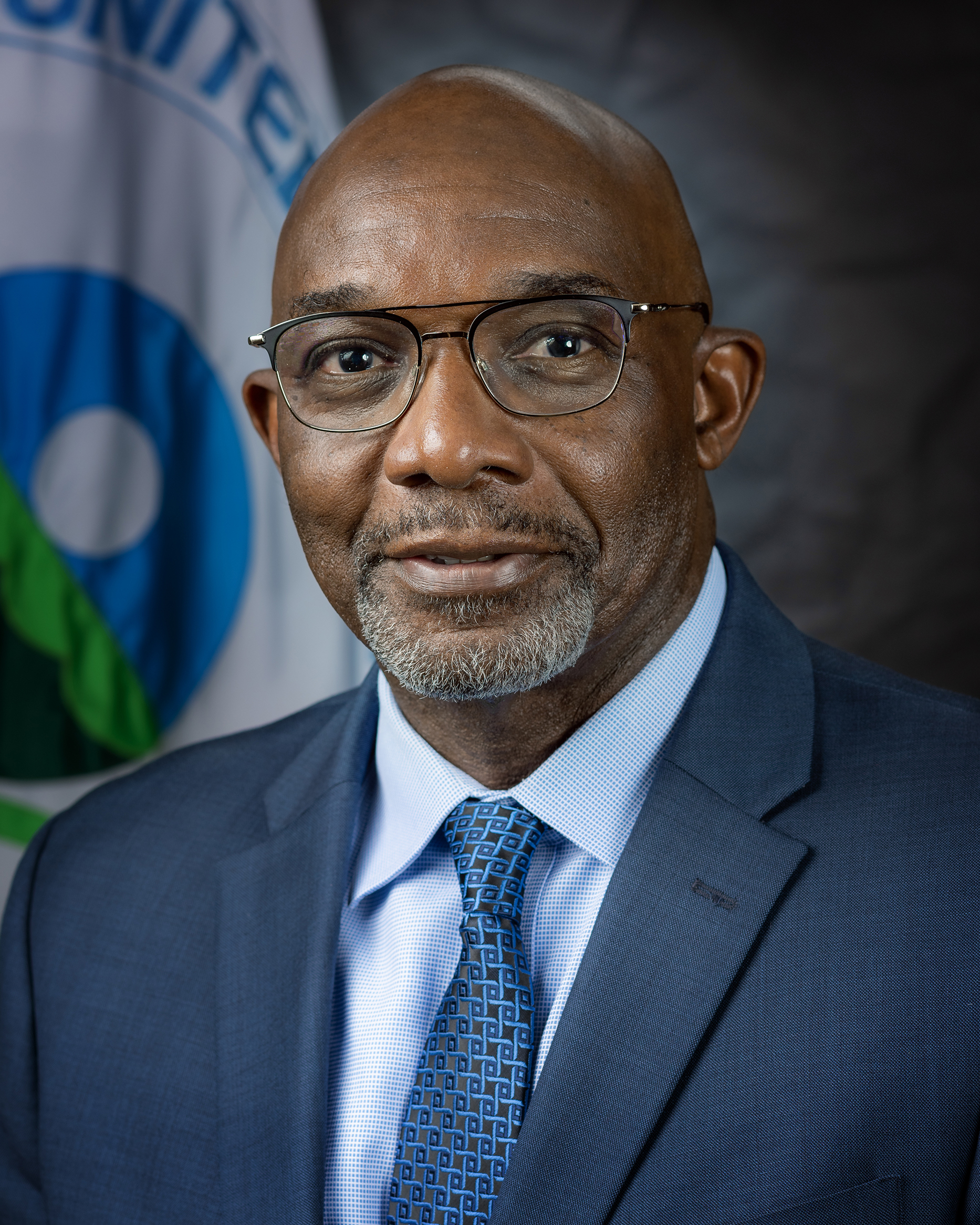
• Brian Frazer, Acting Director, Office of Wetlands, Oceans, and Watersheds, U.S. Environmental Protection Agency
PRESENTERS
- Brian Henkel, Wild Acadia Project Coordinator, Friends of Acadia [PRESENTATION PDF]
- Katie VinZant, Restoration Biologist, National Park Service, Biological Resources Division-Landscape Restoration & Adaptation Branch [PRESENTATION PDF]
BIOS
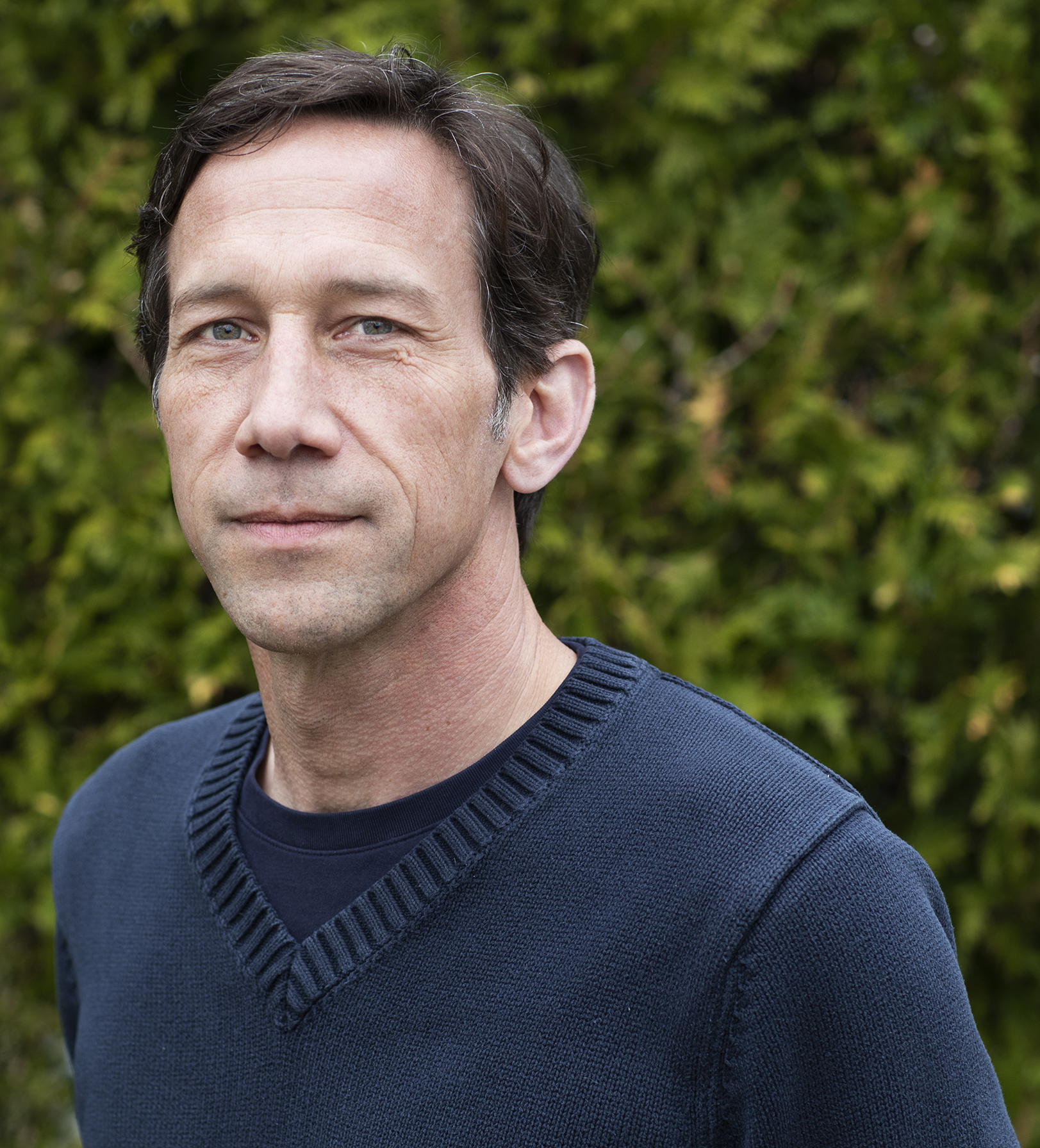 Brian Henkel is the Wild Acadia Project Coordinator at Friends of Acadia. The Wild Acadia initiative is a collaboration between Acadia National Park and Friends of Acadia that takes a watershed-based approach to improving degraded ecological conditions in and around Acadia National Park. Within this collaboration, Brian works with park staff and area partners such as university faculty, students, local towns, and conservation non-profits to collect data, assess resource conditions, plan and initiate projects, and coordinate efforts of the park and stakeholders. The Wild Acadia initiative strives to improve ecological integrity and resiliency within the park and the surrounding communities in the face of rapid environmental change. Brian is a graduate of the University of Texas at San Antonio with a BS in Civil Engineering. He has worked as a hydrologist in groundwater and surface water for more than 20 years.
Brian Henkel is the Wild Acadia Project Coordinator at Friends of Acadia. The Wild Acadia initiative is a collaboration between Acadia National Park and Friends of Acadia that takes a watershed-based approach to improving degraded ecological conditions in and around Acadia National Park. Within this collaboration, Brian works with park staff and area partners such as university faculty, students, local towns, and conservation non-profits to collect data, assess resource conditions, plan and initiate projects, and coordinate efforts of the park and stakeholders. The Wild Acadia initiative strives to improve ecological integrity and resiliency within the park and the surrounding communities in the face of rapid environmental change. Brian is a graduate of the University of Texas at San Antonio with a BS in Civil Engineering. He has worked as a hydrologist in groundwater and surface water for more than 20 years.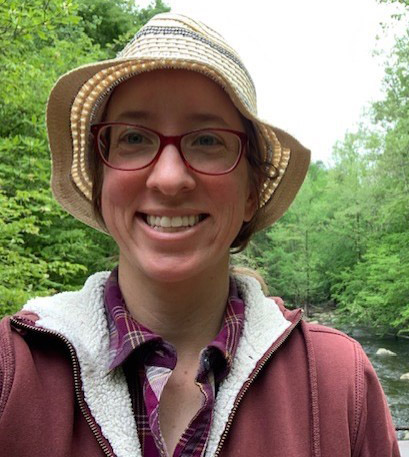 Katie VinZant is a Restoration Biologist working for the National Park Service in the Landscape Restoration and Adaptation Branch of the Biological Resources Division. Katie is based in Denver, CO, but works on restoration projects across the U.S. The key components of her work involve developing restoration plans; acquiring native, genetically appropriate plant materials; and overseeing the implementation of construction/revegetation contracts.
Katie VinZant is a Restoration Biologist working for the National Park Service in the Landscape Restoration and Adaptation Branch of the Biological Resources Division. Katie is based in Denver, CO, but works on restoration projects across the U.S. The key components of her work involve developing restoration plans; acquiring native, genetically appropriate plant materials; and overseeing the implementation of construction/revegetation contracts.
Please click only once on each video recording to view in this window.

MARSH is Coming! Learn More about the new Mentorship Assisted Resource & Support Hub
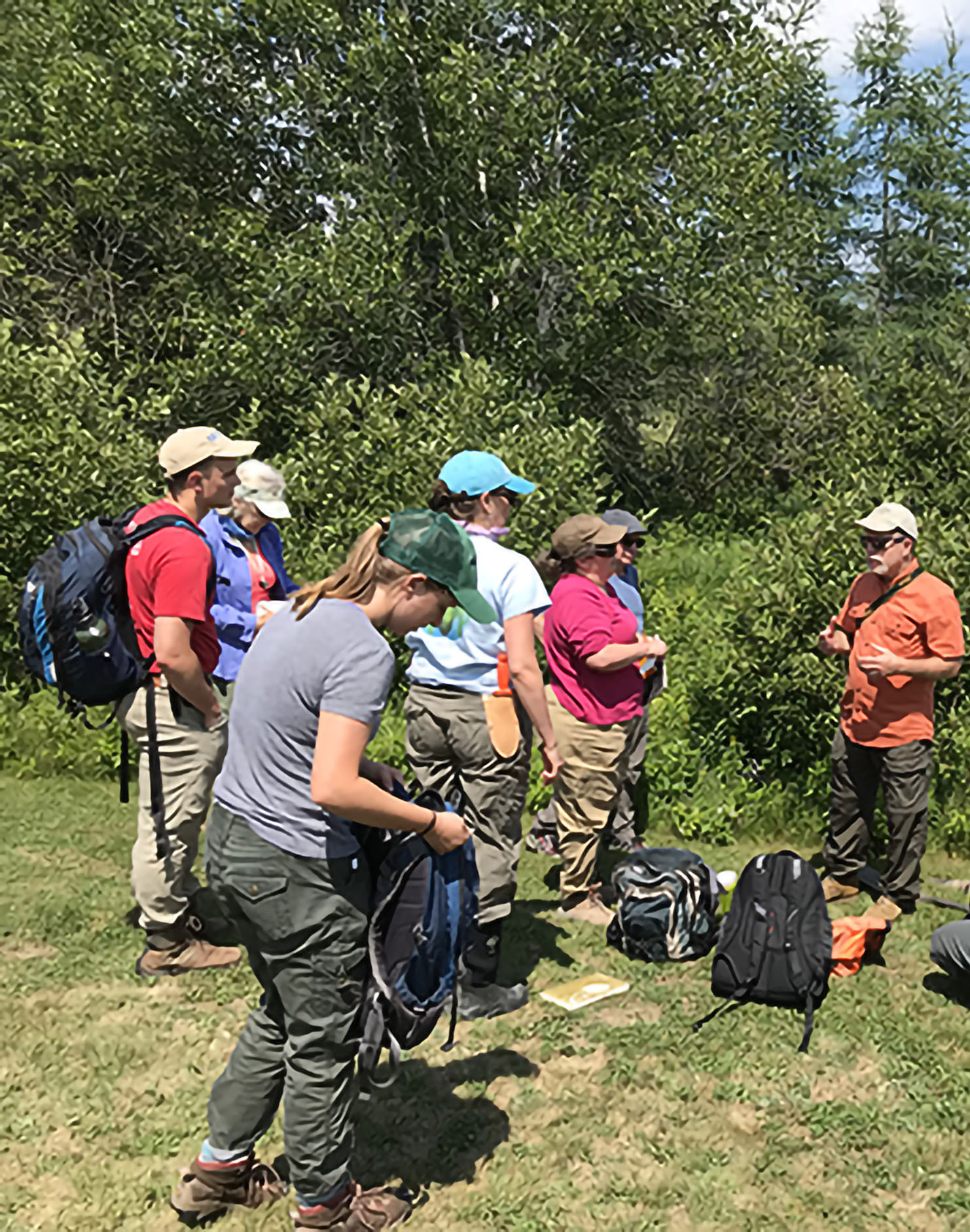 Held Thursday, July 21, 2022 - 3:00 p.m.-4:00 p.m. EDT
Held Thursday, July 21, 2022 - 3:00 p.m.-4:00 p.m. EDT
ABSTRACT
Have you ever wished you could find a mentor to help you navigate the complex world of wetland careers? Or are you passionate about your established career and want to leave a legacy by passing on your wisdom to the next generation? If so, we hope you were able to join us for an informative webinar on a new and exciting collaboration between the National Association of Wetland Managers and the Society of Wetland Scientists called the Mentorship Assisted Resource & Support Hub (aka MARSH). This webinar shared the essential program elements, explain the application process, and provide guidance on how to submit an application. Whether you are a potential mentee or mentor, this program just might provide the meaningful experience you are searching for!
INTRODUCTION
- Portia Osborne, Policy Analyst, National Association of Wetland Managers [PRESENTATION PDF]
PRESENTERS
- Greg Noe, Research Ecologist, U.S. Geological Survey
- Steffanie M. Munguía, PhD Candidate, Florida International University
- Marla Stelk, Executive Director, National Association of Wetland Managers
- Donna Downing, Senior Legal Policy Advisor, National Association of Wetland Managers
BIOS
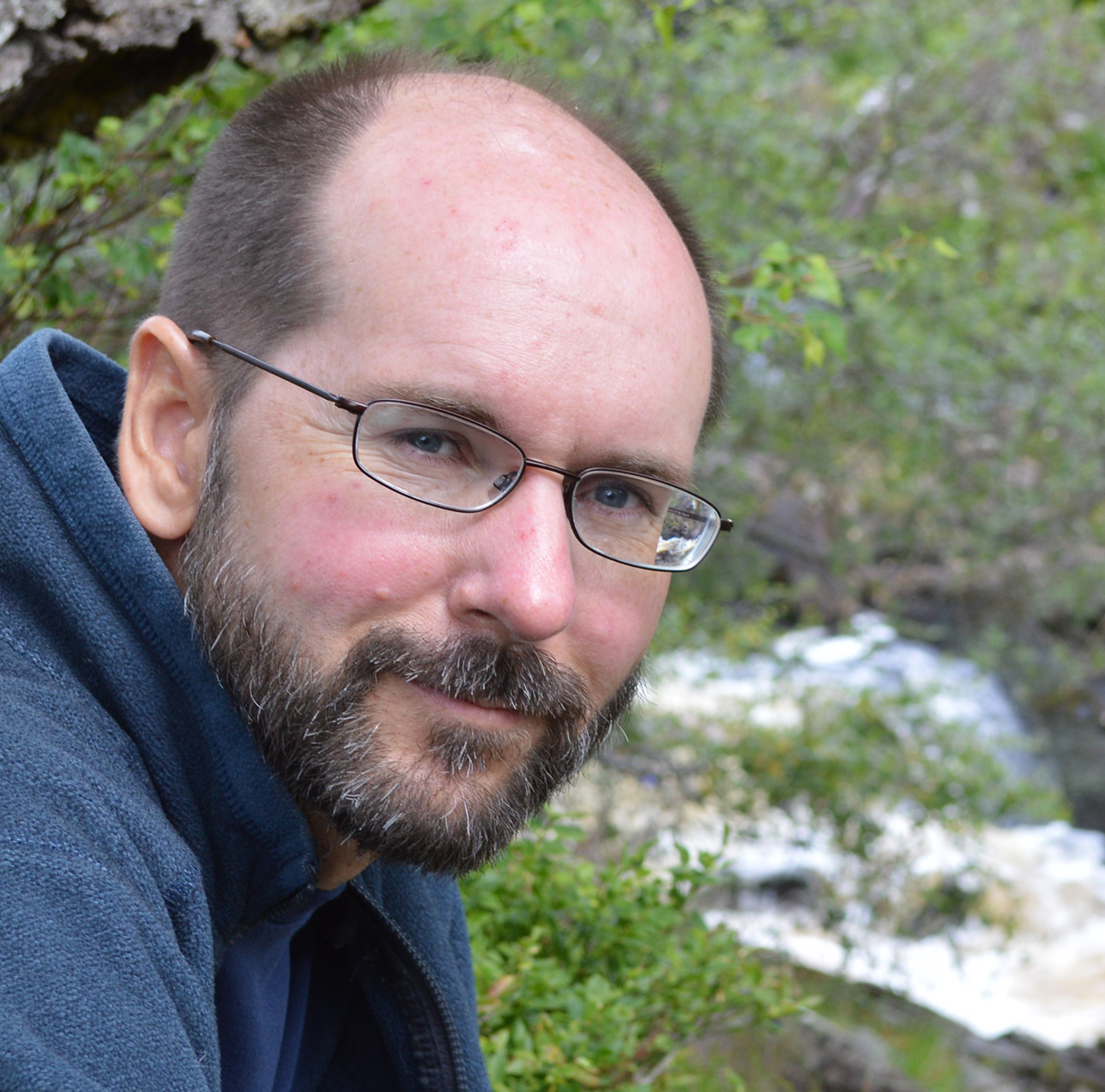 Greg Noe is a Research Ecologist with the U.S. Geological Survey in Reston, VA. His research centers on wetland ecosystem ecology and watershed processes. He is currently the Immediate Past President of the Society of Wetland Scientists, serves on the Science and Technical Advisory Committee of the Chesapeake Bay Program, and serves on the editorial board of Wetlands.
Greg Noe is a Research Ecologist with the U.S. Geological Survey in Reston, VA. His research centers on wetland ecosystem ecology and watershed processes. He is currently the Immediate Past President of the Society of Wetland Scientists, serves on the Science and Technical Advisory Committee of the Chesapeake Bay Program, and serves on the editorial board of Wetlands.
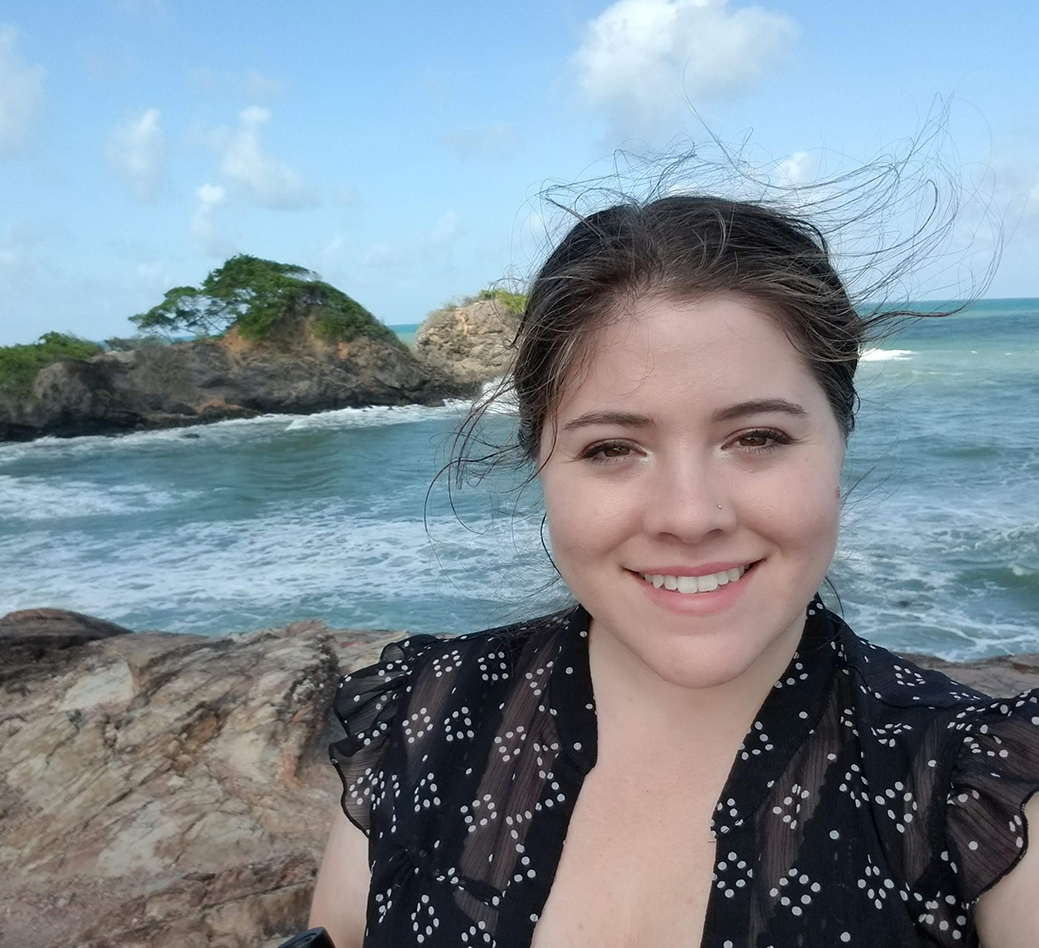 Steffanie Munguía is a PhD candidate in the Department of Earth and Environment at Florida International University, pursuing a doctoral degree in Earth System Science with a concentration in Natural Resource Science and Management. Her dissertation research focuses on evaluating the implementation of the Ramsar Convention, an international environmental agreement for the conservation of wetlands, in coastal wetlands of the Caribbean. Born in Puerto Rico to Cuban and Puerto Rican parents, Steffanie has actively pursued opportunities to work in the region, including earning a Master’s degree in International Environmental Policy with a concentration in Spanish. She has also dedicated much of her time to service to various environmental nonprofits and professional societies, where she primarily provides education and outreach programming for youth and minoritized groups, voices often excluded from conservation conversations. As co-founder and past-chair of the Student Section of the Society of Wetland Scientists, Steffanie has spearheaded a number of training, networking, and leadership development opportunities to raise the profile and impact of student members of the Society.
Steffanie Munguía is a PhD candidate in the Department of Earth and Environment at Florida International University, pursuing a doctoral degree in Earth System Science with a concentration in Natural Resource Science and Management. Her dissertation research focuses on evaluating the implementation of the Ramsar Convention, an international environmental agreement for the conservation of wetlands, in coastal wetlands of the Caribbean. Born in Puerto Rico to Cuban and Puerto Rican parents, Steffanie has actively pursued opportunities to work in the region, including earning a Master’s degree in International Environmental Policy with a concentration in Spanish. She has also dedicated much of her time to service to various environmental nonprofits and professional societies, where she primarily provides education and outreach programming for youth and minoritized groups, voices often excluded from conservation conversations. As co-founder and past-chair of the Student Section of the Society of Wetland Scientists, Steffanie has spearheaded a number of training, networking, and leadership development opportunities to raise the profile and impact of student members of the Society.
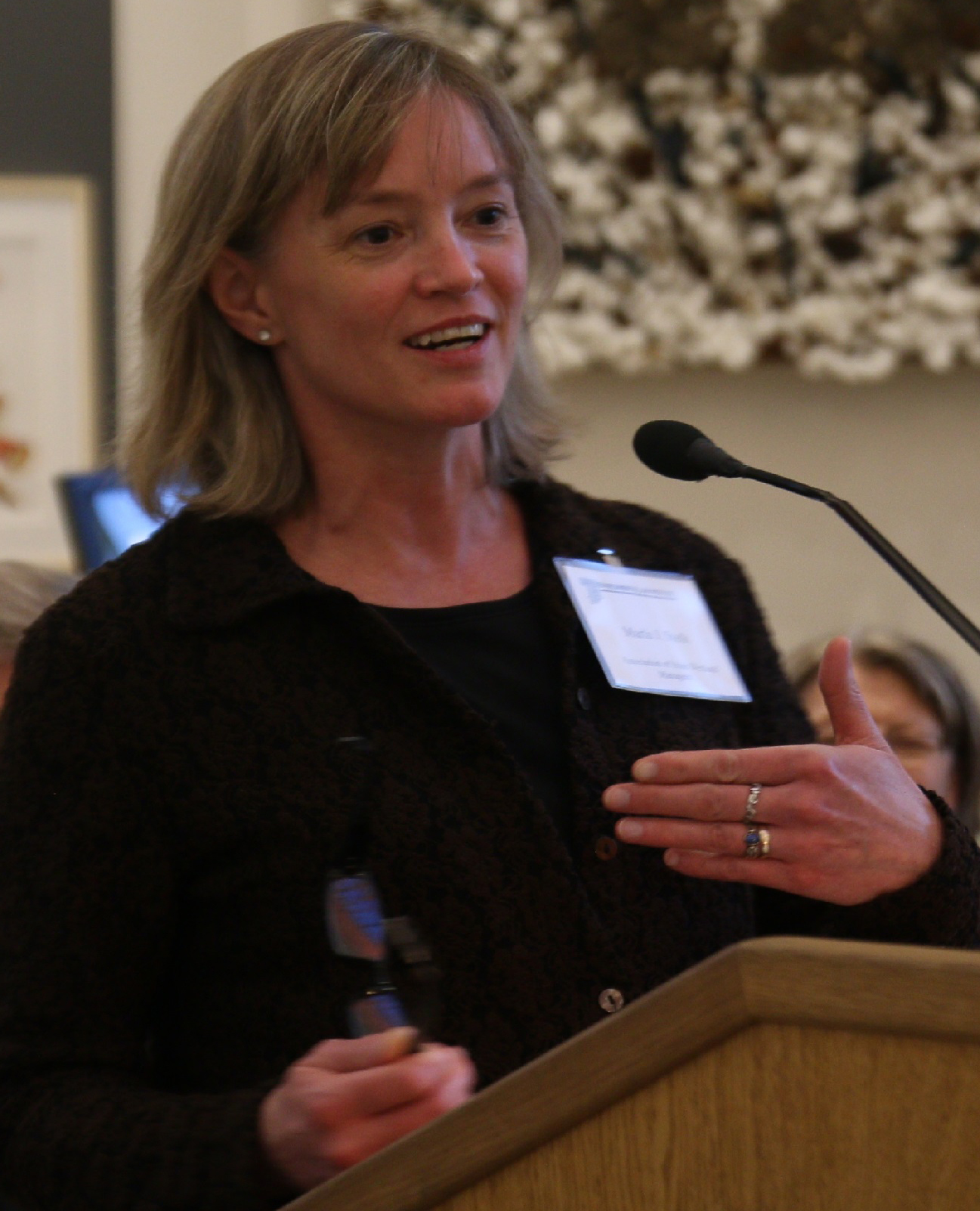 Marla Stelk is the Executive Director at the National Association of Wetland Managers (NAWM) where she has worked on wetland policy and management issues since 2013. Marla has over 25 years of experience working on wetland, water, and wildlife issues, climate change, environmental policy and research, land use planning, communications and organizational leadership. Marla has led research at NAWM on topics such as ecosystem service valuation for wetland restoration, the role of wetlands in floodplain and natural hazard management, wetlands and watershed health, wetland mapping and communications. Prior to coming to NAWM, Marla worked for a variety of environmental and social nonprofit organizations helping to build organizational capacity, manage projects and improve internal processes. Marla earned her MA in Community Planning and Development with a focus on Land Use and the Environment at the University of Southern Maine’s Muskie School of Public Service and her BA in Environmental Issues from Colorado College.
Marla Stelk is the Executive Director at the National Association of Wetland Managers (NAWM) where she has worked on wetland policy and management issues since 2013. Marla has over 25 years of experience working on wetland, water, and wildlife issues, climate change, environmental policy and research, land use planning, communications and organizational leadership. Marla has led research at NAWM on topics such as ecosystem service valuation for wetland restoration, the role of wetlands in floodplain and natural hazard management, wetlands and watershed health, wetland mapping and communications. Prior to coming to NAWM, Marla worked for a variety of environmental and social nonprofit organizations helping to build organizational capacity, manage projects and improve internal processes. Marla earned her MA in Community Planning and Development with a focus on Land Use and the Environment at the University of Southern Maine’s Muskie School of Public Service and her BA in Environmental Issues from Colorado College.
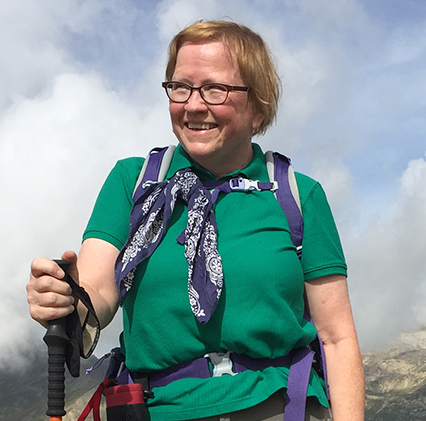 Donna Downing is the Senior Legal Policy Advisor at the National Association of Wetland Managers. Donna was the Jurisdiction Team Leader in the U.S. Environmental Protection Agency’s (EPA) Office of Wetlands, Oceans, and Watersheds from 2007-2020. Donna worked on a variety of issues at EPA, with a focus in recent years on the geographic scope of the Clean Water Act (CWA) in light of the U.S. Supreme Court decisions. She also served as EPA’s staff lead for CWA section 401 water quality certification, and on wetland-related legal issues. Prior to joining EPA in 1998, Donna worked for the U.S. Congress Office of Technology Assessment and in private law practice. She has a BA magna cum laude from Harvard University, an MPP from the University of California at Berkeley, a JD cum laude from Georgetown University Law School, and an LLM in Environmental Law summa cum laude from George Washington University Law School. Donna has been an adjunct professor at George Washington University Law School since 1996, teaching environmental law. In what’s left of her time, she moonlights as a professional potter and an unprofessional horse trainer. Donna also enjoys traveling and has traveled by reindeer sled in the Swedish Arctic, gone winter camping with dog sleds in Minnesota’s Boundary Waters Wilderness Area, and bicycled the Burma Road in China.
Donna Downing is the Senior Legal Policy Advisor at the National Association of Wetland Managers. Donna was the Jurisdiction Team Leader in the U.S. Environmental Protection Agency’s (EPA) Office of Wetlands, Oceans, and Watersheds from 2007-2020. Donna worked on a variety of issues at EPA, with a focus in recent years on the geographic scope of the Clean Water Act (CWA) in light of the U.S. Supreme Court decisions. She also served as EPA’s staff lead for CWA section 401 water quality certification, and on wetland-related legal issues. Prior to joining EPA in 1998, Donna worked for the U.S. Congress Office of Technology Assessment and in private law practice. She has a BA magna cum laude from Harvard University, an MPP from the University of California at Berkeley, a JD cum laude from Georgetown University Law School, and an LLM in Environmental Law summa cum laude from George Washington University Law School. Donna has been an adjunct professor at George Washington University Law School since 1996, teaching environmental law. In what’s left of her time, she moonlights as a professional potter and an unprofessional horse trainer. Donna also enjoys traveling and has traveled by reindeer sled in the Swedish Arctic, gone winter camping with dog sleds in Minnesota’s Boundary Waters Wilderness Area, and bicycled the Burma Road in China.
More information on the Mentorship Program can be found here.
Please click only once on each video recording to view in this window.
American Wetlands Month Webinar: The Importance of Wetlands to Tribal Communities
- U.S. Fish and Wildlife Service
- U.S. Environmental Protection Agency
- National Oceanic and Atmospheric Administration
Held Tuesday, May 24, 2022
ABSTRACT
In celebration of American Wetlands Month this May, this webinar highlighted the cultural importance of wetlands to Tribal communities. Wetlands and other water resources provide Tribes with healthy, traditional foods; plants used for medicinal, healing, and ceremonial purposes; reeds and grasses for weaving baskets and textiles; and fish and other wildlife. During the webinar, three tribal representatives from across the U.S. shared their stories about the cultural importance of wetlands. Presentations addressed tribal uses of wetlands, wetland mapping data and assessment efforts, as well as efforts to protect and restore these valuable resources.
INTRODUCTION
- Portia Osborne, Policy Analyst, National Association of Wetland Managers [PRESENTATION PDF]
MODERATOR
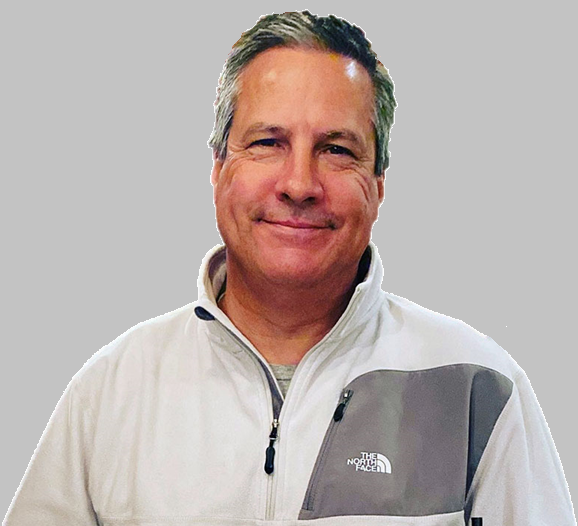 • DJ Monette, Associate Native American Liaison Advisor, U.S. Fish and Wildlife Service Headquarters
• DJ Monette, Associate Native American Liaison Advisor, U.S. Fish and Wildlife Service Headquarters
PRESENTERS
• Nathan Dexter, Native American Liaison, U.S. Fish and Wildlife Service Columbia - Pacific NW Region [PRESENTATION PDF]
• Roger LaBine, Water Resource Technician, Lac Vieux Desert Band of Lake Superior Chippewa Indians [PRESENTATION PDF]
• Jessica Lewis, Environmental Scientist, Mississippi Band of Choctaw Indians [PRESENTATION PDF]
BIOS
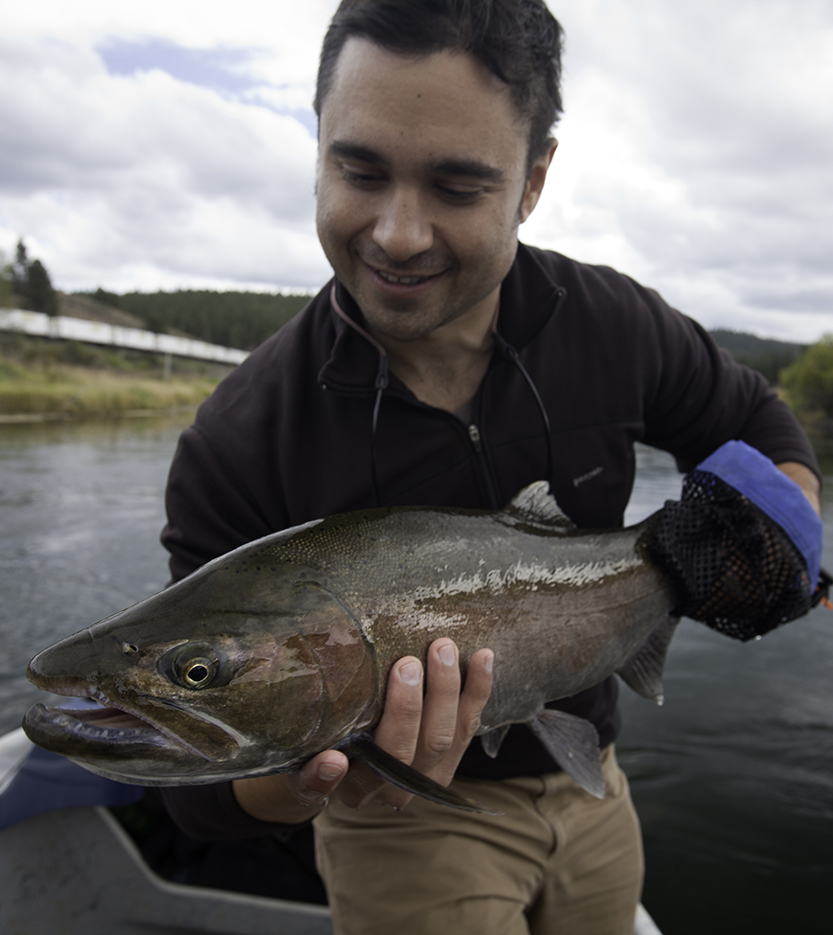
Nathan Dexter (Klamath/Modoc) joined the U.S. Fish and Wildlife Service in 2014 as a Regional Native American Liaison for the Pacific Region in Portland, Oregon. A native Oregonian, Nathan graduated from Lewis & Clark College and the University of Colorado School of Law before embarking on a career that has touched many facets of tribal government. He has worked for an intertribal organization, Oregon Legal Aid Native American Program, a national Indian law firm, as an in-house tribal attorney, and for the Bonneville Power Administration and the Department of Energy.
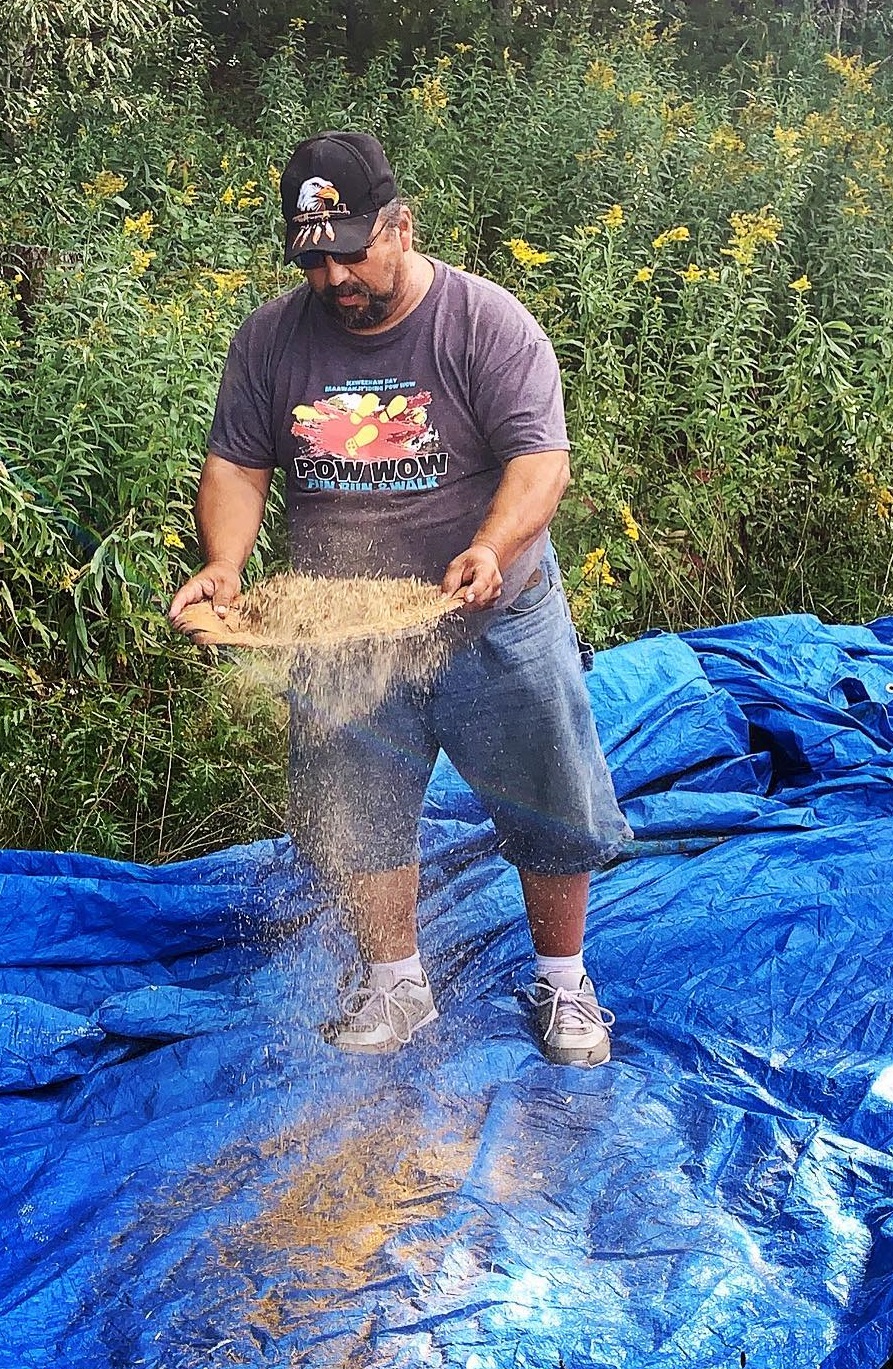 Roger LaBine is an enrolled member of the Lac Vieux Desert Band of Lake Superior Chippewa. He is currently employed in the Environmental Department as a Water Resource Technician with the responsibility of monitoring the water quality of surface waters in tribal territory and involved in the Manoonmin restoration and monitoring program. Roger is the tribal delegate on the Michigan Wild Rice Initiative, co-chairs the Education and Outreach Subcommittee, and co-chairs the Michigan Wild Rice Coalition. He is also a consultant/advisor on several Manoomin Research projects. Roger is a member of the Midewiwin Lodge and received his Mentoring and Teachings from the lodge, his Grandparents and Uncle. He was introduced to Manoomin harvesting and Manoomin Camp in 1972 when he was invited to accompany them in the annual harvest in Northern Wisconsin. He started assisting his Uncle Niigaanaash (Ne-gone-osh) in 1980 with the restoration of Manoomin on Lake Lac Vieux Desert, their tribal homeland. He supported Niigaanaash in his negotiations with the Wisconsin Valley Improvement Company requesting their support in the project and through the litigation to get the waters lowered to promote the return of the Manoomin beds. He has continued the project after Niigaanaash walked in 1999. Roger was the recipient of the 2019 Michigan Heritage Award given by the State of Michigan and Michigan State University for his work of preservation, education, outreach, and restoration efforts throughout the State of Michigan and the Great Lakes Basin. He conducts Manoomin Camps and Manoomin workshops throughout the year across the Great Lakes Basin, and they are open to both the tribal members and to the general public.
Roger LaBine is an enrolled member of the Lac Vieux Desert Band of Lake Superior Chippewa. He is currently employed in the Environmental Department as a Water Resource Technician with the responsibility of monitoring the water quality of surface waters in tribal territory and involved in the Manoonmin restoration and monitoring program. Roger is the tribal delegate on the Michigan Wild Rice Initiative, co-chairs the Education and Outreach Subcommittee, and co-chairs the Michigan Wild Rice Coalition. He is also a consultant/advisor on several Manoomin Research projects. Roger is a member of the Midewiwin Lodge and received his Mentoring and Teachings from the lodge, his Grandparents and Uncle. He was introduced to Manoomin harvesting and Manoomin Camp in 1972 when he was invited to accompany them in the annual harvest in Northern Wisconsin. He started assisting his Uncle Niigaanaash (Ne-gone-osh) in 1980 with the restoration of Manoomin on Lake Lac Vieux Desert, their tribal homeland. He supported Niigaanaash in his negotiations with the Wisconsin Valley Improvement Company requesting their support in the project and through the litigation to get the waters lowered to promote the return of the Manoomin beds. He has continued the project after Niigaanaash walked in 1999. Roger was the recipient of the 2019 Michigan Heritage Award given by the State of Michigan and Michigan State University for his work of preservation, education, outreach, and restoration efforts throughout the State of Michigan and the Great Lakes Basin. He conducts Manoomin Camps and Manoomin workshops throughout the year across the Great Lakes Basin, and they are open to both the tribal members and to the general public.
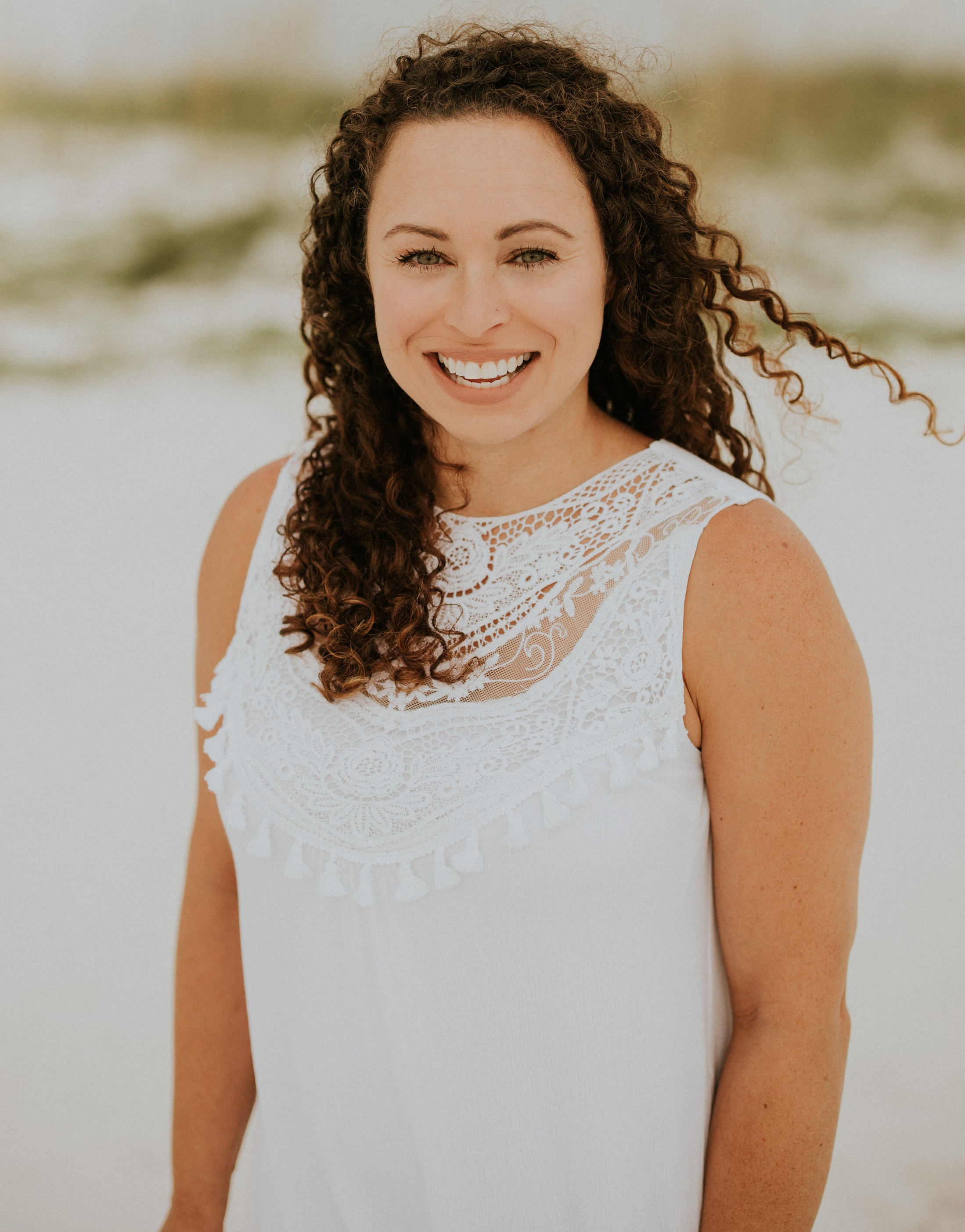 Jessica Lewis serves the Mississippi Band of Choctaw Indians as an Environmental Scientist in the Office of Environmental Protection. She is the program lead for the tribal Wetlands Program and several other environmental programs. Jess has been an FAA licensed drone pilot for three years and uses aerial photography for many program areas including wetland identification, mapping, and evaluation.
Jessica Lewis serves the Mississippi Band of Choctaw Indians as an Environmental Scientist in the Office of Environmental Protection. She is the program lead for the tribal Wetlands Program and several other environmental programs. Jess has been an FAA licensed drone pilot for three years and uses aerial photography for many program areas including wetland identification, mapping, and evaluation.
Please click only once on each video recording to view in this window.
![]()
Wetlands, Flooding, and the Clean Water Act
Held Wednesday, April 13, 2022 - 3:00 p.m.-4:00 p.m. EST
INTRODUCTION
- Brenda Zollitsch, Senior Policy Analyst, National Association of Wetland Managers [PRESENTATION PDF]
PRESENTER
- Hannah Druckenmiller, Fellow, Resources for the Future [PRESENTATION PDF]
CO-AUTHOR
- Charles A. Taylor, PhD Candidate, in Sustainable Development, Columbia University
ABSTRACT
In 2020 the EPA narrowed the definition of ‘Waters of the United States’, significantly limiting wetland protection under the Clean Water Act. Current policy debates center on the uncertainty around wetland benefits. We estimate the value of wetlands for flood mitigation across the U.S. using detailed flood claims and land use data. We find the average hectare of wetland lost between 2001 and 2016 cost society $1,840 annually, and over $8,000 in developed areas. We document significant spatial heterogeneity in wetland benefits, with implications for flood insurance policy and the 50% of ‘isolated’ wetlands at risk of losing federal protection.
BIOS
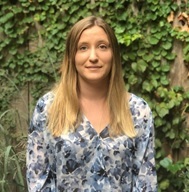 Hannah Druckenmiller is an Environmental Economist and Fellow at Resources for the Future. She received her PhD in Agricultural and Resource Economics in 2021 from UC Berkeley, where she was a doctoral fellow at the Global Policy Lab and an NSF Graduate Research Fellow. Hannah’s research focuses on quantifying the value of healthy ecosystems and assessing the causes and consequences of long-run environmental change. She is studying the effects of forest degradation, wetland loss, and land use change.
Hannah Druckenmiller is an Environmental Economist and Fellow at Resources for the Future. She received her PhD in Agricultural and Resource Economics in 2021 from UC Berkeley, where she was a doctoral fellow at the Global Policy Lab and an NSF Graduate Research Fellow. Hannah’s research focuses on quantifying the value of healthy ecosystems and assessing the causes and consequences of long-run environmental change. She is studying the effects of forest degradation, wetland loss, and land use change.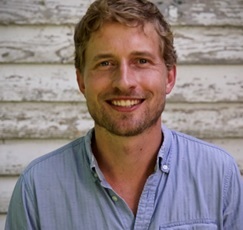 Charles A. Taylor is a PhD candidate in Sustainable Development at Columbia University specializing in environmental economics. His research interests span agriculture, land use, ecosystem services, and climate change. Much of his work involves satellite data and remote sensing. He has taught environmental economics at City College of New York and Fordham University. Previously, he worked at McKinsey & Company, the Bill & Melinda Gates Foundation as an agricultural consultant, and The Earth Partners LP, the land and environmental investment company. He co-founded the Drylands Natural Resource Centre, a farmer-owned cooperative and research center. Charles studied Economics and Political & Social Thought at the University of Virginia.
Charles A. Taylor is a PhD candidate in Sustainable Development at Columbia University specializing in environmental economics. His research interests span agriculture, land use, ecosystem services, and climate change. Much of his work involves satellite data and remote sensing. He has taught environmental economics at City College of New York and Fordham University. Previously, he worked at McKinsey & Company, the Bill & Melinda Gates Foundation as an agricultural consultant, and The Earth Partners LP, the land and environmental investment company. He co-founded the Drylands Natural Resource Centre, a farmer-owned cooperative and research center. Charles studied Economics and Political & Social Thought at the University of Virginia.
Please click only once on each video recording to view in this window.
![]()
PDF List of Past Hot Topics Webinar Recordings
View Upcoming Hot Topics Webinars
